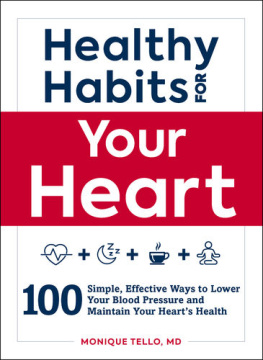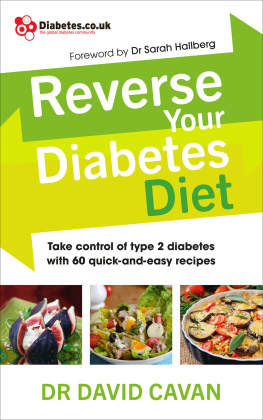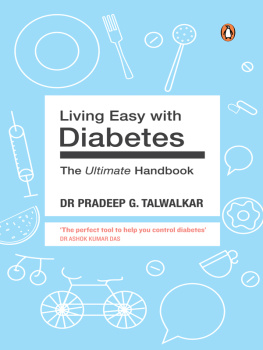Contents



Copyright 2018 by Meredith Corporation, Des Moines, Iowa.
All rights reserved.
For information about permission to reproduce selections from this book, write to or to Permissions, Houghton Mifflin Harcourt Publishing Company, 3 Park Avenue, 18th Floor, New York, NY 10016.
hmhco.com
Library of Congress Cataloging-in-Publication Data is available.
ISBN 978-1-328-49770-3 (pbk)
Book design by Waterbury Publications, Inc., Des Moines, Iowa.
eISBN: 978-1-328-50382-4
v1.1118
Meredith Corporation
Diabetic Living Diabetes Daily
Editorial Director: Jennifer Darling
Creative Director: Michael Belnap
Senior Associate Editor, Caitlyn Diimig, RD
Contributing Project Manager: Shelli McConnell, Purple Pear Publishing, Inc.
Contributing Writer: Bailey McGrath
Contributing Copy Editor: Caitlyn Diimig, Carrie Truesdell
Contributing Proofreader: Gretchen Kauffman
Diabetic Living Test Kitchen Director: Lynn Blanchard
Diabetic Living Test Kitchen Chef: Carla Christian, RD, LD
Contributing Photographers: Jason Donnelly, Carson Downing, Andy Lyons
Contributing Stylists: Joshua Hake, Jennifer Peterson
Houghton Mifflin Harcourt
Executive Editor: Anne Ficklen
Managing Editor: Marina Padakis Lowry
Art Director: Tai Blanche
Production Director: Tom Hyland
Waterbury Publications, Inc.
Design Director: Ken Carlson
Editorial Director: Lisa Kingsley
Associate Editorial Director: Tricia Bergman
Associate Design Director: Doug Samuelson
Associate Design Director: Becky Lau-Ekstrand
Production Assistant: Mindy Samuelson
Graphic Designer: Ruby Hotchkiss
Photography Assistant: Emma Carlson
Pictured on front cover:
from the editors
Good for you! If youre holding this book, youve made an important step toward making shifts in your life that will ensure the well-being of you and your loved ones. A diabetes or prediabetes diagnosis doesnt change who you are, but it does mean you need to make some changes in how you care for yourself. Well help you put the focus on your whole selfmind and body.
The first part of this book teaches you strategies for living mindfully. Start by building a support team of medical and nutrition professionals, other people with diabetes (PWDs), friends, and your family. Learning how to deal with diabetes and getting into new routines is stressful. Well help you identify your stressors and suggest simple, achievable techniques for bringing your stress level down. An important aspect of your self-care is exercise. Discuss your fitness level and abilities with your doctor first, then start slowly with some of the exercises weve outlined. They are a good first step to becoming stronger and meeting weight loss goals.
The other piece to the diabetes-management puzzle is healthful eating. What you eat is a constant in diabetes management. If you use our strategies and recipes, eating mindfully will soon become second nature. These recipes are thoughtfully created with wholesome ingredients and the right amount of nutrients for people with diabetes. These recipes are also delicious and healthful for everyone at the table. They are a good place to start as you learn how to cook with less fat, carbs, and sodium without sacrificing flavor and satisfactionand you dont have to give up dessert! Charts with two full weeks of menus make it easy to jump-start your new eating plan. We show you how to fill your plate healthfully with appropriate-size portions. Youll also learn how to snack to benefit your body and resist emotional eating.
Changing your lifestyle wont be a direct path. Youll struggle and take a step backward now and again. When that happens, reach for this book to get yourself back on track. Living and eating mindfully is something you can doand were here to help.

contents

how stress affects diabetes
Managing stress will be your new normal to set you in the best path to health.
The constant worry about complications, the tedious carbohydrate counting, the guilt when you skip exercise, the anger you feel because you cant eat like others. Its exhausting and stressful.
Theres a term for thisits called diabetes distressand it can affect those with diabetes at any point in their lives.
Distress is a normal reaction to the stresses and strains of managing a progressive, chronic disease like diabetes. Its the constant sense of burden or defeat you cant seem to shake. Many things can trigger it, such as feeling deprived by being unable to eat certain foods and getting a high blood glucose reading after a healthful meal.
Plus, the stigma that comes with type 2 diabetes and prediabetes can be burdensome. Its hard to get emotional support when the outside worlds attitude is youve brought this on yourself, says Lawrence Fisher, Ph.D., of the University of California, San Francisco. This can take a toll on both your physical health and mental health.
But getting the fears and feelings out and understanding theyre a normal part of having diabetes helps. Later in this book, youll learn how to overcome stress and anxiety and combat the negative thoughts that can come with a .
But even if youre not experiencing diabetes distress, the daily stressors of life might affect your blood sugar levels. Hormones such as epinephrine and cortisol can increase during stressful events and could encourage the liver to produce extra glucose, causing blood sugars to spike. Prolonged stress can manifest itself into physical issues as well (see ).
There are healthy ways to handle stressful situations. In this book, well teach you how to be more mindful and present with your feelings. Plus, youll be equipped with 5-minute tricks to calm you down when youre starting to feel overwhelmed (). These are a few strategies to try right now.
Be More Mindful
Keep your thoughts on the present; live where your feet are.
Observe your thoughts. Meditate, journal, or simply stop to breathe to reflect on whats going through your mind.
Accept your emotions without judgment. Remember that there are no right or wrong ways to feel.
Dont dwell on the past or worry about the future.
Take yourself off autopilot. Sometimes our reactions to situations are automatic, such as anger in traffic. Instead, be more aware of your reactions.

stress symptoms
If you have one or more of these issues, your body may be trying to tell you about underlying, prolonged stress.
Stomach
Queasiness
Heartburn
Abdominal pain
Diarrhea
If you experience acute or chronic stomach distress, see a doctor to rule out a serious condition such as ulcers or heart disease.
Head
Tension headaches


















